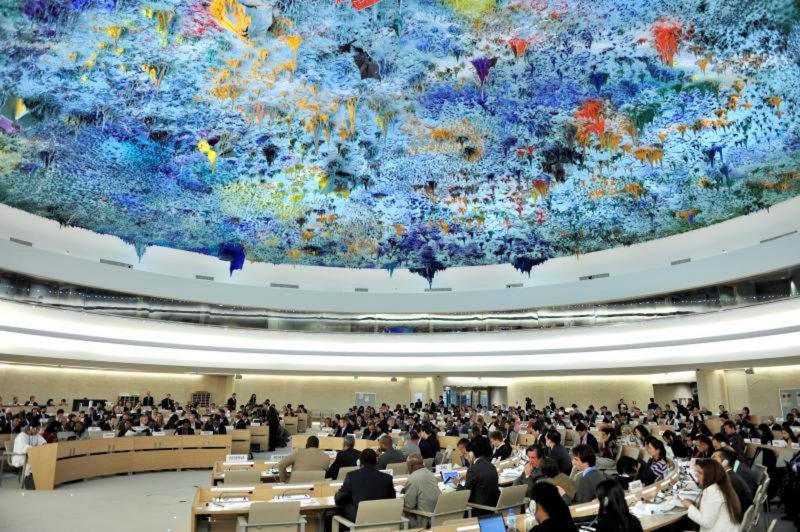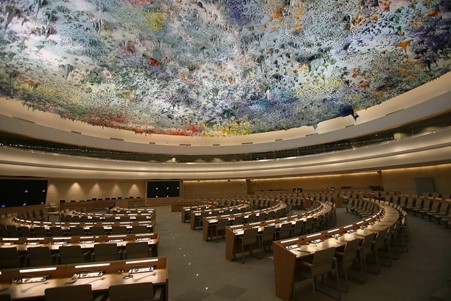Voices from the Sylff Community
The COVID-19 pandemic is challenging the international community’s commitment to human rights protection. Ana Zdravkovic, a PhD candidate at the University of Belgrade, looks at the “derogation clauses” included in most international human rights treaties, which allow for the temporary suspension of certain rights in emergency situations, and notices a disturbing trend in how states are approaching them.
* * *
Derogations: A “Necessary Evil”
It hardly comes as a surprise that the vast majority of international human rights treaties provide contracting states with the possibility to temporarily derogate from their treaty commitments during states of emergency.[i] After the atrocities of World War II, at the time of drafting core instruments of human rights law, no one really questioned the need for some sort of escape mechanism to be used in emergency cases, such as war, natural disasters, riots, public health crises, or other extraordinary circumstances. Naturally, the option of human rights suspension is accompanied by carefully created substantial and procedural restrictions.
The rationale behind these so-called derogation clauses is straightforward: states should be allowed some space to confront and resolve the crisis and even derogate from their international obligations, with the aim of urgently restoring the previous state of normalcy, where full compliance with human rights treaties would be guaranteed. It was accepted that in the absence of this “necessary evil,” states would likely cease to meet their obligations during emergencies, but with a greater risk of violations due to lack of supervision. “Derogation clauses” enable the international community not only to identify and monitor alleged human rights abuses during exceptional circumstances but also to preserve and protect the core (non-derogable) rights of individuals.
ICCPR’s Derogating Mechanism in a Nutshell

The UN Human Rights Council meets in the Human Rights and Alliance of Civilizations Room, Palace of Nations, Geneva (Switzerland).
The International Covenant on Civil and Political Rights (ICCPR) is a one-of-a-kind, multilateral treaty aimed at protecting civil and political human rights and freedoms. It entered into force on March 23, 1976, and 173 states have ratified the treaty and became its parties so far. The document appears to be the strongest confirmation of the international community’s dedication to human rights protection, at least in terms of first-generation human rights. However, the COVID-19 pandemic may reveal otherwise.
As can be expected, the ICCPR has its own derogation mechanism, namely Article 4, which reads as follows:
- In time of public emergency which threatens the life of the nation and the existence of which is officially proclaimed, the States Parties to the present Covenant may take measures derogating from their obligations under the present Covenant to the extent strictly required by the exigencies of the situation, provided that such measures are not inconsistent with their other obligations under international law and do not involve discrimination solely on the ground of race, colour, sex, language, religion or social origin.
- No derogation from articles 6, 7, 8 (paragraphs 1 and 2), 11, 15, 16 and 18 may be made under this provision.
- Any State Party to the present Covenant availing itself of the right of derogation shall immediately inform the other States Parties to the present Covenant, through its intermediary of the Secretary-General of the United Nations, of the provisions from which it has derogated and of the reasons by which it was actuated. A further communication shall be made, through the same intermediary, on the date on which it terminates such derogation.
The first paragraph of Article 4 prescribes the circumstances in which states can lawfully and validly derogate from their obligations. To begin with, there must be a “public emergency which threatens the life of the nation,” such as war, rebellion, terrorist attacks, a natural disaster, or a public health emergency. Although the Siracusa Principles on the Limitation and Derogation Provisions in the ICCPR[ii] provide with detailed guidance for the interpretation of the ICCPR in this regard, there is no denying that a health crisis such as a pandemic can amount to a public emergency, since Article 4 has already been activated in public health crises in the past.[iii] When it comes to the COVID-19 situation, it represents an actual emergency seriously affecting and threatening the entire humankind, especially from the points of view of death tolls, the almost complete collapse of healthcare systems, its impact on the global economy, and the riots and protests it is constantly triggering. As for the requirement that the emergency be officially proclaimed, on March 11, 2020, the World Health Organization declared the COVID-19 outbreak a pandemic. Even prior to that date, many states had enacted emergency measures with the aim of curbing the spread of the deadly virus.[iv] Additional substantial conditions laid down by Article 4 require striking a fair balance between derogating measures and the actual needs of the particular situation, provided that the means used are not discriminatory or inconsistent with other obligations under international law.[v]
The second paragraph of Article 4 protects certain rights from derogation, so that they will continue to apply regardless of the state of emergency and must be protected under any circumstances. In particular, according to the ICCPR, the following are non-derogable rights: the right to life; freedom from torture and from cruel, inhuman, or degrading treatment or punishment; freedom from slavery or servitude; the right not to be imprisoned for contractual debt; freedom from retroactive criminal punishment; the right to recognition as a person before the law; and freedom of thought, conscience, and religion.[vi]
Finally, the last paragraph prescribes the procedural conditions, which oblige state parties to immediately issue a notification to the UN Secretary-General with relevant provisions, reasons, and justifications and to provide additional communication on the date of termination of such derogating measures. The requirements are intended to ensure that all state parties are duly informed about the state of emergency and derogations taking place in one’s territory in order to enable active monitoring of ICCPR compliance, as well as potential abuse of emergency powers and possible breaches of human rights.[vii]
ICCPR: A Casualty of the COVID-19 Pandemic?
Although all of the abovementioned substantial and procedural requirements should always be examined on a case-by-case basis, the challenges of the COVID-19 pandemic may constitute a public emergency requiring certain derogations in almost every state across the globe. This is even more so, taking into account all of the measures implemented around the world for the purpose of curbing virus transmission (such as border closures, travel restrictions, curfews, and total prohibition of movement). Nevertheless, since the outbreak of the pandemic, only 22 states have officially notified the UN Secretary-General of their intention to impose measures derogating from their obligations under the ICCPR, which is rather peculiar.[viii] One may hastily assume that this necessarily indicates the ignorance of the state parties about the provisions of the treaty, and hence that they failed to act in accordance with it.
However, there is another solution that may have been used by those who did not resort to derogations. Imposed measures affect rights that are not absolute in nature, primarily the right to liberty of movement (Article 12), freedom to manifest religion or beliefs (Article 18), right to freedom of expression (Article 19), right of peaceful assembly (Article 21), and right to freedom of association (Article 22). The provision allowing their limitations during ordinary times (permissible restrictions) seems to be the common ground to all of them. Put differently, the ICCPR recognizes the potential need of a state to limit certain rights in order to protect some of the enumerated collective interests, including public health. There are prescribed conditions that need to be fulfilled in order to apply permissible restrictions: the restrictions must be provided by law, proportionate and necessary for the protection of health, and nondiscriminatory. Therefore, it is perfectly comprehensible that some governments decided not to declare a state of emergency and not to opt for derogations, but rather to stay inside the regular framework of human rights treaties and to limit certain rights and freedoms to the extent required by the health crisis.
Unfortunately, there are arguments showing that this may not be the case. Firstly, in April 2020 the UN Human Rights Committee issued a statement expressing concern because “several states parties have resorted to emergency measures in response to the COVID-19 pandemic in a manner seriously affecting the implementation of their obligations under the Covenant, without formally submitting any notification of derogation from the Covenant.”[ix] Furthermore, as elaborated earlier, other human rights treaties also include similar derogation mechanisms. The European Convention on Human Rights procedurally requires that contracting states notify the Secretary General of the Council of Europe of their intention to derogate from their obligations. So far 11 states have issued such notifications, but strangely enough, this number includes ICCPR parties that failed to send any notification to the UN Secretary-General.[x] Similarly, there are at least 5 states that informed the Secretary General of the Organization of American States about the suspension of certain rights guaranteed by the American Convention on Human Rights but failed to notify the UN Secretary-General.[xi] It goes without saying that a state cannot derogate from its obligations under one of these treaties and not do so under another, without inevitably breaching provisions of the one it ignored.
Hence, it appears that the COVID-19 pandemic brought, apart from all other miseries, chaos into the long-crafted human rights system. The ICCPR, once a strong pillar of the International Bill of Human Rights and a great successor to the Universal Declaration of Human Rights, suddenly became completely disregarded and passed over by its state parties. Governments either seemed reckless when it came to their human rights obligations, pretending that there was no need for triggering relevant emergency mechanisms, or starkly revealed that they were more eager to cherish the regional human rights systems they belonged to. As Professor Dominic McGoldrick famously stated back in 2004, “The response of a state to a public emergency is an acid test of its commitment to the effective implementation of human rights.”[xii]
In an attempt to not finish in this worrisome tone, I will note that the pandemic is still not over, which gives us time to revive ourselves and get back on the path we chose more than half a century ago with the adoption of the Universal Declaration of Human Rights — a path of protecting, respecting, and promoting human rights worldwide.
[i] See for example Article 4 of the International Covenant on Civil and Political Rights, UN Treaty Series, vol. 999, 171; Article 15 of the European Convention on Human Rights, as amended by Protocols Nos. 11 and 14, November 4, 1950, ETS 5; and Article 27 of the American Convention on Human Rights, Organization of American States. The African Charter, however, contains no derogation clause; see African Charter on Human and Peoples’ Rights, Organisation of African Unity.
[ii] The Siracusa Principles on the Limitation and Derogation Provisions in the International Covenant on Civil and Political Rights, September 28, 1984, UN Doc. E/CN.4/1985/4.
[iii] For example, Georgia activated Article 4 in 2006 due to the H5N1 virus, while in 2009 Guatemala opted for derogation in response to the influenza A (H1N1) epidemic. See https://treaties.un.org/Pages/ViewDetails.aspx?src=TREATY&mtdsg_no=IV-4&chapter=4&clang=_en (accessed February 9, 2021).
[iv] For more information, see https://www.icnl.org/covid19tracker/ (accessed February 9, 2021).
[v] For a detailed analysis, see for example Sarah Joseph and Melissa Castan, The International Covenant on Civil and Political Rights: Cases, Materials, and Commentary (Oxford: Oxford University Press, 2013), 910–23.
[vi] In addition, the prohibition of the death penalty is non-derogable according to the Second Optional Protocol to the ICCPR, https://www.ohchr.org/en/professionalinterest/pages/2ndopccpr.aspx (accessed February 9, 2021).
[vii] Although the UN Human Rights Committee did not clarify whether the failure to notify the UN Secretary-General would invalidate the derogation, the author is of the opinion that derogations that contravene Article 4 in any manner, including procedural, cannot be considered lawful.
[viii] These states are Argentina, Armenia, Azerbaijan, Chile, Colombia, the Dominican Republic, Ecuador, El Salvador, Estonia, Ethiopia, Georgia, Guatemala, Kyrgyzstan, Latvia, Namibia, Paraguay, Peru, the Republic of Moldova, Romania, San Marino, Senegal, and Thailand; see https://treaties.un.org/Pages/ViewDetails.aspx?src=TREATY&mtdsg_no=IV-4&chapter=4&clang=_en (accessed February 10, 2021).
[ix] UN Human Rights Committee, “Statement on derogations from the Covenant in connection with the COVID-19 pandemic,”, April 30, 2020, CCPR/C/128/2, https://www.ohchr.org/Documents/HRBodies/CCPR/COVIDstatementEN.pdf (accessed February 10, 2021).
[x] By comparing publicly available lists of declarations, it can be concluded that Albania, North Macedonia, and Serbia did derogate from the ECHR but not from the ICCPR; see https://www.coe.int/en/web/conventions/full-list/-/conventions/treaty/005/declarations and https://treaties.un.org/Pages/ViewDetails.aspx?src=TREATY&mtdsg_no=IV-4&chapter=4&clang=_en (February 10, 2021).
[xi] The 5 states are Bolivia, Honduras, Jamaica, Panama, and Suriname; see https://www.rightofassembly.info/assets/downloads/Derogations_from_the_Right_of_Peaceful_Assembly_(at_11_November_2020)_.pdf (accessed February 10, 2021).
[xii] Dominic McGoldrick, “The interface between public emergency powers and international law,” International Journal of Constitutional Law 2, no. 2 (April 2004), 388.

